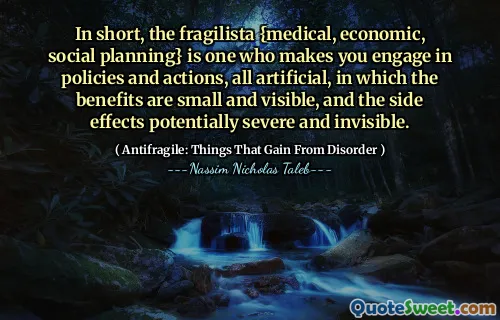
There is an element of deceit associated with interventionism, accelerating in a professionalized society. It's much easier to sell "Look what I did for you" than "Look what I avoided for you." Of course a bonus system based on "performance" exacerbates the problem.
Nassim Nicholas Taleb's observation incisively critiques the nature of interventionism within complex societies and institutions. He exposes a fundamental bias toward visible achievements rather than the subtle, yet critical, acts of prevention. This deception—whether deliberate or systemic—is deeply ingrained in professional environments where metrics and visible outcomes dominate evaluations. The tendency to highlight concrete action over avoided harm reflects a broader societal preference for immediate, tangible results, which can be misleading. Actions that prevent disasters or problems typically leave no visible trace, making the individuals who avert crises less noticeable and harder to reward.
The critique extends to the institutional frameworks that govern incentives, such as bonus systems tied directly to performative measures. These systems inadvertently encourage interventions designed to produce demonstrable outputs, rather than thoughtful restraint or risk mitigation. This dynamic can enrich short-term popular narratives but undermine long-term stability and resilience.
Taleb's insight aligns with themes in "Antifragile," which advocates for embracing disorder and recognizing value in the unseen forces shaping systems. His statement challenges readers to rethink how society values and rewards contributions. It invites deeper consideration of how incentives might be restructured to acknowledge not just direct accomplishments, but also the prevention of adverse outcomes—often the more antifragile and sustainable approach. Ultimately, this quotation is a call to look beyond superficial metrics and acknowledge the invisible work critical to healthy systems.










